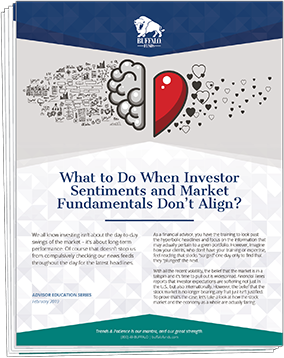Market Sentiment vs Fundamentals
Above-average GDP growth, a robust job market, and double-digit earnings growth are some of the fundamentals that indicate current economic conditions are still fairly strong. However, the biggest threat to the economy is arguably investor confidence itself.
We all know investing isn’t about the day-to-day swings of the market – it’s about long-term performance. Of course that doesn’t stop us from compulsively checking our news feeds throughout the day for the latest headlines.
With all the recent volatility, the belief that the market is in a tailspin and it’s time to pull out is widespread. Financial Times reports that investor expectations are softening not just in the U.S., but also internationally. However, the belief that the stock market is no longer bearing any fruit just isn’t justified.
To prove that’s the case, we take a look at how the stock market and the economy as a whole are actually fairing. In this latest report from the Buffalo Funds, we discuss:
|
|
Opinions expressed are those of the author or Funds and are subject to change, are not intended to be a forecast of future events, a guarantee of future results, nor investment advice. Active investing has higher management fees because of the manager’s increased level of involvement while passive investing has lower management and operating fees. Investing in both actively and passively managed mutual funds involves risk and principal loss is possible. Both actively and passively managed mutual funds generally have daily liquidity. There are no guarantees regarding the performance of actively and passively managed mutual funds. Actively managed mutual funds may have higher portfolio turnover than passively managed funds. Excessive turnover can limit returns and can incur capital gains.
Fundamental Approach
We get to know the companies we invest in and learn how they run their business.
Top-Down & Bottom-Up
We identify Top-Down broad, secular growth trends and search for companies from the Bottom-Up.
Proprietary Philosophy
We construct our portfolios based on our own proprietary investment strategy.
Disciplined Investing
Sticking to our disciplined investment strategy ensures we maintain a consistent, balanced approach.

